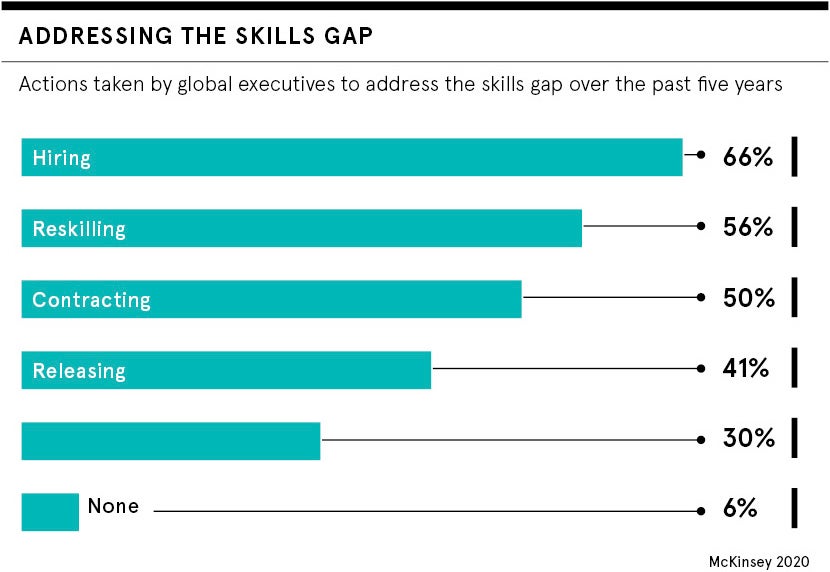
The pandemic turned millions of office-based businesses into virtual companies overnight, inevitably resulting in a greater reliance on technology.
This means it is arguably more important than ever to invest in employee development and tech skills. Even pre-pandemic, government figures showed eight out of ten advertised openings required some level of digital skills.
Organisations should be seeking opportunities to reskill and upskill people from all backgrounds, and develop careers in the high-growth, high-demand tech sector. This is particularly relevant given the well-publicised shortage of tech and digital skills in the UK.
But the skills gap also means businesses will need more flexible ways of mobilising talent, says Mo Isap, founder and chief executive of training, consultancy and digital transformation services provider IN4.0 Group.
The firm experienced more than 80 per cent growth during the COVID-19 lockdown, compared to the same period last year. It has seen specific demand for data analysts and internet of things engineers, with companies needing to ensure their data is accessible in the cloud.
“The uncomfortable truth is that although many businesses are trying to undergo digital transformation and innovate in the face of a global crisis, they lack enough top talent to get them there,” says Isap.
Many businesses are trying to undergo digital transformation and innovate, but lack enough top talent
“And while there are plenty of graduates emerging from our world-class university system, they aren’t necessarily ‘work ready’ with the right blend of technical expertise and soft skills. It’s not like businesses can wait either. This is an acute problem that needs to be solved right now.”
Connecting talent to address skills gaps
The organisation has, therefore, launched the IN4.0 Talent Academy, a skills training programme designed to address the digital skills gaps across Greater Manchester and Lancashire.
“It has been designed to act as a bridge connecting talent from diverse backgrounds with businesses in the North West that need to drive digital transformation,” says Isap. “We run a 12-week programme, which acts like a bonus term for graduates to build on their academic achievements.”
The course comprises a blend of soft skills and technical know-how, including accreditations from Amazon Web Services (AWS) and the Institution of Engineering and Technology, plus a work placement.
However, it’s not just young people who benefit from skills training. There have been several IT vendor-led initiatives focused on providing often-overlooked candidates, such as the long-term unemployed, refugees, asylum seekers, older people and veterans, with the skills to enter or re-enter the workforce.
AWS re/Start is a skills development and training programme that prepares individuals for careers in cloud computing and connects them with potential employers. The programme is focused on reskilling the unemployed and underemployed, such as young people with little or no technology experience and ex-military personnel and their families.
Technology and engineering consultancy BJSS has opened its doors to several ex-military AWS re/Start graduates. They have been so successful that BJSS has now built its own version of the programme to fast track successful participants into full-time roles.
“While we can recruit highly technical and capable graduates from university, there is a lot to say for people who have experienced life, travelled the world, developed a range of skills and worked under pressure,” says Michael Fordham, cloud consultant for BJSS. “Our ex-military recruits tend to be pragmatic, strategic and focused on collaboration.”

Building basic digital skills
According to government data, more than eleven million people in the UK lack basic digital skills, while four million working adults are without any digital skills. One of the biggest challenges will be reskilling those people who may need to transition from less-skilled, manual roles to work with digital platforms for the first time.
“Reskilling them to become digital operatives will be an undertaking and business will have responsibility to help make it possible, alongside effective regional economic policy,” says Phil Jones, managing director at business technology solutions provider Brother UK.
At the other end of the skills spectrum are the digital specialists, who work in the technology sector – coders, analysts and systems architects – and above them, in the top 1 per cent of the digital hierarchy, the digital scientists.
However, Jones notes that while a relatively high proportion of UK GDP comes from the digital economy, a third of its employees are non-UK nationals, so there is a shortfall at all levels which needs to be addressed.
“We shouldn’t need to rely on overseas talent, although it’s always healthy to have the brightest and smartest brains, and the obvious uncertainty of what our post-Brexit immigration policy looks like makes this an issue we can’t afford to ignore,” he says.
The pandemic has highlighted our dependence on technology. As businesses look to embrace this new reality, they must prioritise investment in ensuring employees are proficient in the latest digital technologies or they risk being left behind.

The pandemic turned millions of office-based businesses into virtual companies overnight, inevitably resulting in a greater reliance on technology.
This means it is arguably more important than ever to invest in employee development and tech skills. Even pre-pandemic, government figures showed eight out of ten advertised openings required some level of digital skills.
Organisations should be seeking opportunities to reskill and upskill people from all backgrounds, and develop careers in the high-growth, high-demand tech sector. This is particularly relevant given the well-publicised shortage of tech and digital skills in the UK.
